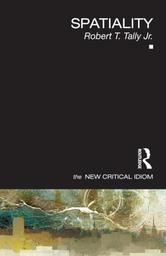Spatiality (London and New York: Routledge, 2013).

Spatiality has emerged as a key concept in literary and cultural studies, as the 'spatial turn' in the humanities has emphasized the significance of space, place, and mapping. Literary cartography, geography, and geocritcism offer new approaches to traditional literary analysis, history, and theory.
In this lucid introduction to spatial approaches to literature, Robert T. Tally Jr. explores differing aspects of spatiality in literary studies today, providing:
- An overview of the spatial turn across literary criticism and theory, from historicism and postmodernism to postcolonialism and globalization;
- Introductions to the major theorists of spatiality, including Michel Foucault, Gilles Deleuze, David Harvey, Edward Soja, Georg Lukács, and Fredric Jameson;
- Analysis of critical perspectives on spatiality, such as the writer as map-maker, literature of the city and urban space, and the concepts of literary geography, cartographics and geocriticism.
This clear and engaging study presents readers with a thought provoking and illuminating guide to the literature and criticism of ‘space.’
